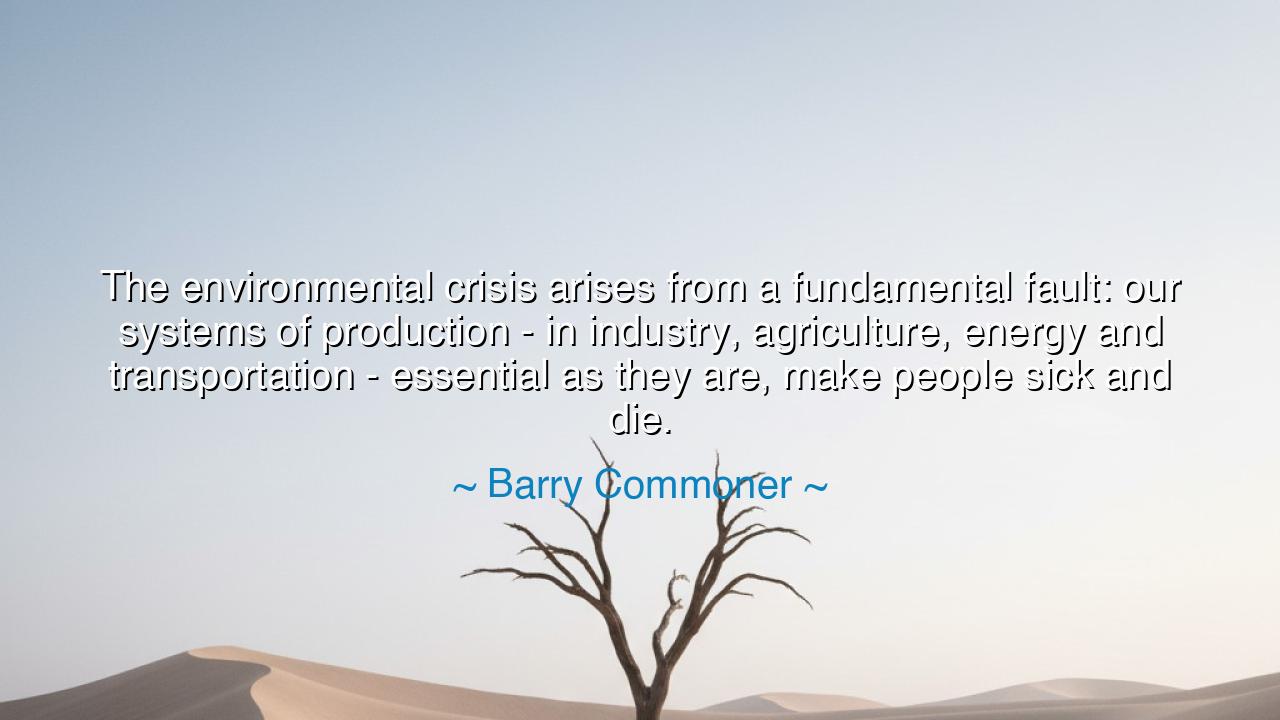
The environmental crisis arises from a fundamental fault: our
The environmental crisis arises from a fundamental fault: our systems of production - in industry, agriculture, energy and transportation - essential as they are, make people sick and die.






In the grave voice of one who saw the storm long before others heard its thunder, Barry Commoner declared: “The environmental crisis arises from a fundamental fault: our systems of production — in industry, agriculture, energy and transportation — essential as they are, make people sick and die.” His words carry the weight of prophecy, for they strike at the heart of humanity’s relationship with progress. This is not merely a warning—it is an indictment, spoken in sorrow and moral clarity, against a civilization that has confused advancement with wisdom, and profit with prosperity.
Barry Commoner, one of the founding fathers of modern environmentalism, spoke at a time when the world was intoxicated by industry. The 20th century had given birth to marvels—electricity, automobiles, chemical fertilizers, and plastics—that promised abundance. Yet Commoner, trained as a biologist and awakened as a humanist, saw the hidden decay beneath this glittering surface. The very systems that sustained our way of life, he warned, were poisoning it. The environmental crisis was not a natural disaster but a manmade one—a sickness born from the belief that nature could be endlessly exploited without consequence.
The fundamental fault Commoner speaks of lies not in technology itself, but in its purpose. Industry, agriculture, and energy are not evil in essence; they are the tools of survival. But when driven by greed rather than harmony, they become engines of death. The industrial smokestacks that built cities also blackened skies; the pesticides that fed nations seeped into rivers and bodies; the automobiles that brought freedom filled the air with invisible poison. In seeking to master nature, humankind forgot that it, too, was part of her body—and now that body grows feverish and frail.
Consider the story of Minamata Bay in Japan—a tragedy that Commoner himself often cited. In the mid-20th century, a chemical factory discharged mercury into the sea, contaminating the fish that sustained the local people. The result was Minamata disease, a neurological affliction that crippled and killed generations. Children were born twisted and blind; adults lost their minds and their dignity. The corporation responsible called it “the cost of progress.” Yet Commoner saw it for what it was: a symptom of a civilization that had severed its moral conscience from its technological genius.
In his writings, Commoner often described the “Four Laws of Ecology.” The first and greatest was this: Everything is connected to everything else. When a river is poisoned, the people who drink from it are poisoned. When the soil is stripped, the harvest becomes hollow. The systems of production that sustain life must therefore be governed by the same principle that governs nature—balance. When balance is broken, the disease spreads from the earth to the human body, from ecosystems to economies. In this way, the environmental crisis is also a crisis of the human spirit.
But Commoner’s message was not one of despair. He believed that knowledge could restore harmony—that science guided by ethics could heal what science driven by greed had harmed. He urged the world to reimagine production not as domination, but as partnership: clean energy instead of fossil fuel, organic farming instead of chemical dependency, recycling and renewal instead of waste. His vision was not of returning to the past, but of evolving beyond exploitation toward stewardship.
The lesson of his quote is clear and timeless: the systems that give us life must not also bring death. Every generation must ask not only, Can we build this?, but Should we? To heal the world, we must realign industry with integrity, economy with ecology, and progress with compassion. Each of us, whether farmer, engineer, or consumer, carries a share of this duty. We must choose wisely what we buy, what we waste, what we burn, and what we protect.
Thus, Barry Commoner’s words stand as both warning and invitation—to awaken, to act, to mend the broken covenant between humanity and the earth. “Our systems of production make people sick and die,” he said. Yet they can also make people live and thrive—if we dare to rebuild them with wisdom. Let this be our work: not merely to survive upon the earth, but to dwell upon it with reverence, health, and grace.






AAdministratorAdministrator
Welcome, honored guests. Please leave a comment, we will respond soon